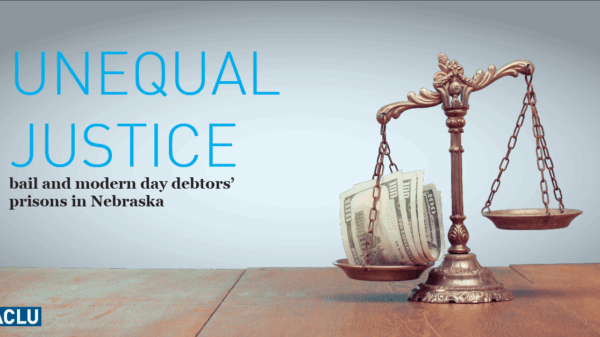Nebraska’s county jails in four largest counties overflowing with people jailed due to inability to pay fines and fees
LINCOLN, Neb – Today the ACLU of Nebraska released the findings of an almost year-long investigation into the ways the Nebraska criminal justice system handles fines and fees imposed on low-income Nebraskans. The ACLU says that for Nebraskans who cannot afford to pay fines, the result is unequal justice and conditions which foster a modern-day debtors’ prison.
The organization’s investigation focused on two key aspects of the criminal justice system in Nebraska that unfairly imprison the poor for their poverty despite clear prohibitions against such practices in both state and federal law: the imposition of monetary bail as a condition of pretrial release and fines and fees imposed because of criminal conviction. Across the nation the ACLU is leading the charge to call attention to these practices and to seek reform through judicial branch advocacy, legislative policy change, and litigation. Around the country, individual courts as well as legislatures are reforming these systems, in addition to litigation filed by ACLU affiliates and other organizations.
“For too many low-income Nebraskans, our justice system has become a dizzying maze of fines and fees from which they cannot escape,” said Danielle Conrad, Executive Director of the ACLU of Nebraska. “People are being jailed simply because they cannot afford fines or fees set by the courts and many times these are set without an individualized inquiry into their ability to pay. The practice is unconstitutional and has devastating impacts on real Nebraska families who are torn apart by these actions and on Nebraska taxpayers who foot the bill. We can and must enact common-sense solutions to end modern-day debtors’ prisons. Our investigation has revealed a variety of successful reforms in other jurisdictions that we should explore to stop these harms, like judicial branch education, attorney training, and local governments providing more robust access to counsel."
The ACLU’s investigation involved analyzing court records from Nebraska’s four largest counties: Douglas, Lancaster, Sarpy, and Hall. Additionally, ACLU lawyers, interns, clerks, and volunteers spent time in 10 different courtrooms for about 50 hours during the summer and fall of 2016 to observe proceedings.
“In these four counties, people are imprisoned for not paying fines or fees set by courts. Many times these fines and fees are the result of low-level nonviolent infractions like traffic tickets. Our results revealed that about half of those languishing in county jails are there while presumed innocent and awaiting trial. This does little to protect public safety. More than 30 years ago, the Supreme Court ruled that it is unconstitutional to send people to jail for not paying legal fines and fees they cannot afford, yet this practice continues in Nebraska,” continued Conrad.
Key findings in Unequal Justice also include:
- Over 5 in 10 people who could not pay bail are people of color. For the same offenses, Blacks, Latinos, and Native Americans were typically charged over $10,000 more in bail.
- Over half of those in jail because they cannot bail out are accused of nonviolent offenses.
- Courts in every observed hearing failed to ask about ability to pay when imposing a fine.
- The average nonviolent offender in jail when we surveyed had been sitting in jail for 48 days unable to post bail to go home.
- The four largest counties in Nebraska will spend over $73 million on their FY2017 jail budget.
“Our current bond and fine systems criminalize poverty,” said Joe Nigro, Lancaster County Public Defender. “Pretrial release programs which screen people for risk factors and can assess the level of supervision needed, are more effective at assuring someone appears in court than simply rewarding the person who can come up with a set amount of money. For one person, $100 is the same as $10,000 for another. One night in jail can mean the loss of a job, housing, and custody of children. If a bond requiring money is set, the primary factor considered by the court must be the person’s ability to pay. Our current system discriminates against the poor.”
In recent years, the four largest counties in Nebraska have had to bring forth bond issues to help pay for their growing jail populations. They are not alone. The National Association of Counties has been working since 2015 to help counties save taxpayer dollars by reforming bail practices.
“First and foremost, we must ensure that we are in compliance with federal law when it comes to imposing fines and court costs on defendants,” said Mary Ann Borgeson, Chair of the Douglas County Board of Commissioners. “We should not be infringing upon people’s civil rights and incarcerating nonviolent offenders simply because they are poor and cannot afford to pay. We are in support of the ACLU’s efforts of reform.”
The ACLU says the ultimate cost of this system, though, is born by the low-income families who get trapped in it.
For a copy of the report: https://www.aclunebraska.org/unequaljustice
Stay Informed
Sign up to be the first to hear about how to take action.
By completing this form, I agree to receive occasional emails per the terms of the ACLU’s privacy statement.
By completing this form, I agree to receive occasional emails per the terms of the ACLU’s privacy statement.

